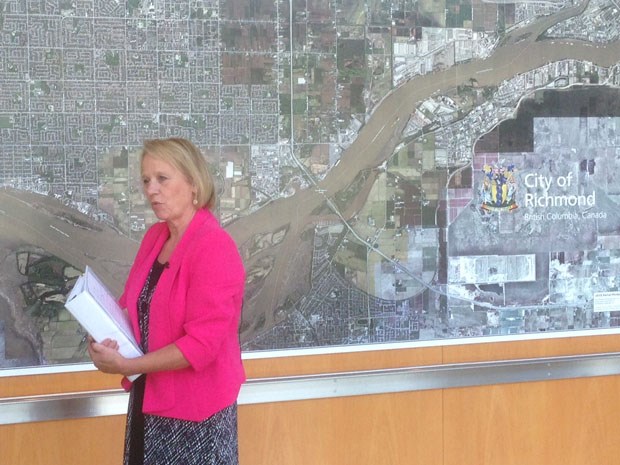Motorists will have to continue to put up with congestion at the George Massey Tunnel until the right solution is found.
That’s what Richmond councillors and the city’s director of transportation, Victor Wei, agreed during discussion on his report looking at a couple of alternatives to the $3.5-billion bridge at the heart of the George Massey Tunnel Replacement Project.
On Monday, Richmond politicians endorsed the report that responded to third party studies recently assembled by the Corporation of Delta into the comprehensive volume that has been forwarded to all B.C. MLAs. Delta is urging the new NDP provincial government to continue with the project.
The Richmond report calls on Victoria to suspend work on the 10-lane bridge project, which Wei described as “beyond comprehension” when considering its height, as well as the heights of its interchanges, pending a comprehensive review and analysis of crossing options.
Admitting the alternatives require further analysis, Wei put forward two options, both involving seismically upgrading the current tunnel to withstand a one-in-475-year seismic event.
The tunnel would then have a lifespan similar to the Oak Street and Queensborough bridges, he explained.
Saying there would be no problem adding a second tunnel adjacent to the existing crossing, Wei proposed either a second four-lane tunnel with two of the lanes dedicated to buses and three-person HOV until rapid transit is added. The other option is strictly a two-lane transit and HOV lane only tunnel, which he estimated would be around $400 million cheaper than a larger tube. That money could be directed toward enhancing transit.
Both options could easily fit within the $3.5-billion budget, he said.
Noting accidents rates for the tunnel are similar to other crossings, Wei said a thorough study and consultation will take a couple of years and, once approvals are granted, it could be another five years to build the alternative.
“It’s more important we have the right solution because if it’s wrong, it’s going to be wrong for many generations to come,” he said.
Richmond Coun. Harold Steves said the technology and knowhow are available and the new tunnel, as with the original tube, could be completed in a couple of years.
Reminding his councillors to be respectful of Delta and not refer to the bridge project as “the bridge to nowhere,” Richmond Mayor Malcom Brodie said his city was never consulted after the former Liberal government’s surprise announcement there would be a new crossing, but instead was simply told what would be happening.
Noting a new bridge would have LRT capability for the future, Alex Loo was the lone Richmond councillor to vote against the recommendations, saying the region would end up getting a lot less when it comes to moving goods and people efficiently.
Adding she wouldn’t want to tell people stuck in traffic they’ll be waiting another 10 years for relief, Loo said governments have always been underestimating the required designs for crossings, which should be avoided now with an expected million people moving to the region.
Delta CAO George Harvie said the points raised in the Richmond report have already been thoroughly covered and answered.
“The fact is, all their recommendations and options were previously reported on. What we’re saying is, ‘Yes, we’ve seen these options before but we rely on the reports the Ministry of Transportation consultants and staff did,” said Harvie.
“One that’s a cause of concern for us is the significant environmental impacts and the poor seismic performance of the existing tunnel. The environmental impacts are, of course, the fisheries, and there was no such thing as an environmental assessment when the tunnel was put in the ’50s. Certainly, we don’t support any impact to the Fraser River either by significant dredging or especially dredging that would put in a new tunnel,” he said.
Harvie added proposing another tunnel would trigger a federal environmental review that would surely reject such a crossing.
Richmond council also agreed that a communications strategy be undertaken. Like Delta, Richmond has set up its own tunnel replacement section on the city’s website.
The Corporation of Delta, meanwhile, is using the electronic message board near the entrance of the tunnel to call for support for the bridge project.



